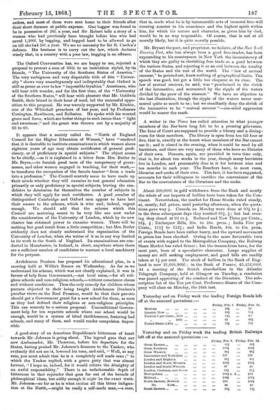It appears that a society called the "North of England
Council for the Higher Education of Women," have "resolved -that it is desirable to institute examinations in which women above eighteen years of age may obtain certificates of general profi- ciency, or of proficiency in special subjects." The object seems to be chieffy,—as it is explained in a letter from Mrs. Butler to Mr. Bryce,—to furnish good tests of the competency of gover- nesses, and other women engaged in teaching, for their work,— to transform the occupation of the female teacher "from a trade into a profession." The Council scarcely seem to have made up 'their minds whether they will examine to test general education primarily or only proficiency in special subjects, leaving the can- didates to determine for themselves the number of subjects in which they will apply for such certificates. A good number of distinguished Cambridge and Oxford men appear to have lent their names to the scheme, which is wise and, indeed, urgent enough. We should add that the scheme which this 'Council are maturing seems to be very like one now under the consideration of the University of London, which by its new -charter has obtained power to examine women. There will be nothir g but good result from a little competition ; but Mrs. Butler -evidently does not clearly understand the organization of the University of London, when she writes of it as in any way limited in its work to the South of England. Its examinations are con- ducted in Manchester, in Ireland, in short, anywhere where there are a sufficient number of candidates to warrant a local machinery for the purpose.






























 Previous page
Previous page